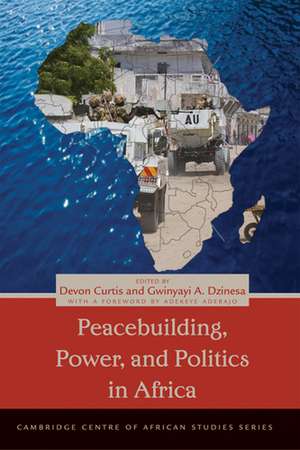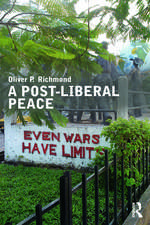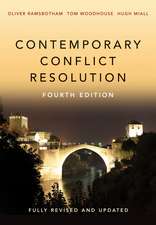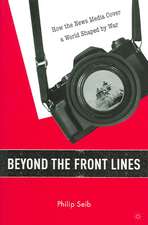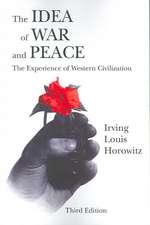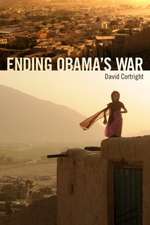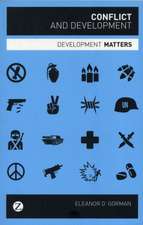Peacebuilding, Power, and Politics in Africa: Cambridge Centre of African Studies
Editat de Devon Curtis, Gwinyayi A. Dzinesa Cuvânt înainte de Adekeye Adebajoen Limba Engleză Paperback – 20 sep 2012
Peacebuilding, Power, and Politics in Africa is a critical reflection on peacebuilding efforts in Africa. The authors expose the tensions and contradictions in different clusters of peacebuilding activities, including peace negotiations; statebuilding; security sector governance; and disarmament, demobilization, and reintegration. Essays also address the institutional framework for peacebuilding in Africa and the ideological underpinnings of key institutions, including the African Union, NEPAD, the African Development Bank, the Pan-African Ministers Conference for Public and Civil Service, the UN Peacebuilding Commission, the World Bank, and the International Criminal Court. The volume includes on-the-ground case study chapters on Sudan, the Great Lakes Region of Africa, Sierra Leone and Liberia, the Niger Delta, Southern Africa, and Somalia, analyzing how peacebuilding operates in particular African contexts.
The authors adopt a variety of approaches, but they share a conviction that peacebuilding in Africa is not a script that is authored solely in Western capitals and in the corridors of the United Nations. Rather, the writers in this volume focus on the interaction between local and global ideas and practices in the reconstitution of authority and livelihoods after conflict. The book systematically showcases the tensions that occur within and between the many actors involved in the peacebuilding industry, as well as their intended beneficiaries. It looks at the multiple ways in which peacebuilding ideas and initiatives are reinforced, questioned, reappropriated, and redesigned by different African actors.
A joint project between the Centre for Conflict Resolution in Cape Town, South Africa, and the Centre of African Studies at the University of Cambridge.
The authors adopt a variety of approaches, but they share a conviction that peacebuilding in Africa is not a script that is authored solely in Western capitals and in the corridors of the United Nations. Rather, the writers in this volume focus on the interaction between local and global ideas and practices in the reconstitution of authority and livelihoods after conflict. The book systematically showcases the tensions that occur within and between the many actors involved in the peacebuilding industry, as well as their intended beneficiaries. It looks at the multiple ways in which peacebuilding ideas and initiatives are reinforced, questioned, reappropriated, and redesigned by different African actors.
A joint project between the Centre for Conflict Resolution in Cape Town, South Africa, and the Centre of African Studies at the University of Cambridge.
Preț: 276.57 lei
Nou
Puncte Express: 415
Preț estimativ în valută:
52.93€ • 57.47$ • 44.46£
52.93€ • 57.47$ • 44.46£
Carte tipărită la comandă
Livrare economică 22 aprilie-06 mai
Preluare comenzi: 021 569.72.76
Specificații
ISBN-13: 9780821420133
ISBN-10: 0821420135
Pagini: 360
Dimensiuni: 152 x 229 x 28 mm
Greutate: 0.44 kg
Ediția:1
Editura: Ohio University Press
Colecția Ohio University Press
Seria Cambridge Centre of African Studies
ISBN-10: 0821420135
Pagini: 360
Dimensiuni: 152 x 229 x 28 mm
Greutate: 0.44 kg
Ediția:1
Editura: Ohio University Press
Colecția Ohio University Press
Seria Cambridge Centre of African Studies
Recenzii
“What makes (Peacebuilding, Power, and Politics in Africa) particularly interesting is the emphasis on peacebuilding as a process in which local and global ideas interact: ideas that are mediated by local, national, and regional actors…. This is topical and relevant, as it is becoming more and more clear that local actors may not necessarily share the objectives, strategies and priorities of externally driven peace-building programmes.”—International Affairs
“This edited work brings together a rich mix of scholarship, from different disciplinary perspectives, on the politics and checkered outcomes of peacebuilding in Africa…Its breadth and the rigor of certain chapters should place this volume on obligatory reading lists for students of conflict and peace, particularly in Africa, for years to come.”—Canadian Journal of African Studies
“This volume is a must for anyone interested in developing further understanding of security, peacebuilding and the politics of Africa. It would make an excellent contribution to any senior-level politics/international relations course on the topic and promises to be relevant well into the foreseeable future.”—South African Journal of International Affairs
“The contributors represent a rich variety of nationalities, areas of expertise, analytical approaches, and policy perspectives…. It will be of interest to advanced students. and to peace and conflict studies professionals in the academy and the third sector. Highly recommended for college, university, and larger public libraries, and collections specializing in Africana and international studies.”—Choice
“This is a fine work of collective, substantiated scholarship. Particularly praiseworthy is its list of authors. Many are extremely well known in the field and highly regarded. Many are also African scholars, which is a major contribution of its own, introducing them to a non-Africanist peace building audience and implementing a widely shared, current goal in the field of creating ‘north-south’ networks of scholars.” —Susan Woodward, Professor, PhD Program in Political Science, The Graduate Center, City University of New York
“Although competition for resources in a peacebuilding process has often been discussed in the literature, the competition for meaning that this volume addresses adds a new dimension to the discussion…. The additional critical Africanist lens employed by mostly African scholars offers an important and necessary perspective that has not been so readily available in the literature thus far.”
— Strategic Review for Southern Africa
— Strategic Review for Southern Africa
“All the chapters are relevant, and give the book coherence as a source of up-to-date information and knowledge on peacebuilding in Africa. Equally important is the emphasis that the chapters bring to bear on a critical reading of international peace building efforts in Africa.”
— Cyril Obi, Program Director of the African Peacebuilding Network at the Social Science Research Council
— Cyril Obi, Program Director of the African Peacebuilding Network at the Social Science Research Council
Notă biografică
Devon Curtis is a lecturer in the Department of Politics and International Studies at the University of Cambridge, and a fellow of Emmanuel College. Her main research interests and publications deal with power-sharing and governance arrangements following conflict, African rebel movements, and critical perspectives on conflict, peace, and development. She is currently writing a book about peacebuilding in Burundi.
Gwinyayi A. Dzinesa was a senior researcher at the Centre for Conflict Resolution in Cape Town, South Africa. Previously, he was a lecturer in the Department of International Relations at the University of the Witwatersrand, a visiting scholar at the International Peace Research Institute, Oslo, and a research officer at the Centre for Defense Studies at the University of Zimbabwe. He is the coeditor of Region Building in Southern Africa (2012).
Gwinyayi A. Dzinesa was a senior researcher at the Centre for Conflict Resolution in Cape Town, South Africa. Previously, he was a lecturer in the Department of International Relations at the University of the Witwatersrand, a visiting scholar at the International Peace Research Institute, Oslo, and a research officer at the Centre for Defense Studies at the University of Zimbabwe. He is the coeditor of Region Building in Southern Africa (2012).
Cuprins
- Foreword
Adekeye Adebajo - Acknowledgments
- Abbreviations
- Introduction
The Contested Politics of Peacebuilding in Africa
Devon Curtis - Part I
PEACEBUILDING: THEMES AND DEBATES- 1. Peace as an Incentive for War
David Keen - 2. Statebuilding and Governance
The Conundrums of Legitimacy and Local Ownership
Dominik Zaum - 3. Security Sector Governance and Peacebuilding
Eboe Hutchful - 4. The Limits of Disarmament, Demobilization, and Reintegration
Paul Omach
- 1. Peace as an Incentive for War
- Part II
INSTITUTIONS AND IDEOLOGIES- 5. The Role of the African Union, New Partnership for Africa’s Development, and African Development Bank in Postconflict Reconstruction and Peacebuilding
Gilbert M. Hhadiagala - 6. Peacebuilding as Governance
The Case of the Pan-African Ministers Conference for Public and Civil Service
Chris Landsberg - 7. The United Nations Peacebuilding Commission
Problems and Prospects
’Funmi Olonisakin and Eka Ikpe - 8. Financing Peace?
The World Bank, Reconstruction, and Liberal Peacebuilding
Graham Harrison - 9. The International Criminal Court
A Peacebuilder in Africa?
Sarah Nouwen
- 5. The Role of the African Union, New Partnership for Africa’s Development, and African Development Bank in Postconflict Reconstruction and Peacebuilding
- Part III
CASE STUDIES- 10. The Politics of Negotiating Peace in Sudan
Sharath Srinivasan - 11. Peacebuilding in the Great Lakes Region of Africa
René Lemarchand - 12. Peacebuilding through Statebuilding in West Africa?
The Cases of Sierra Leone and Liberia
Comfort Ero - 13. Oil and Peacebuilding in the Niger Delta
Aderoju Oyefusi - 14. Disarmament, Demobilization, and Reintegration in Southern Africa
Namibia, Angola, and Mozambique
Gwinyayi A. Dzinesa - 15. Peacebuilding without a State
The Somali Experience
Christopher Clapham
- 10. The Politics of Negotiating Peace in Sudan
- Bibliography
- Contributors
- Index
Descriere
Peacebuilding, Power, and Politics in Africa is a critical reflection on peacebuilding efforts in Africa. The authors expose the tensions and contradictions in different clusters of peacebuilding activities, including peace negotiations; statebuilding; security sector governance; and disarmament, demobilization, and reintegration.
